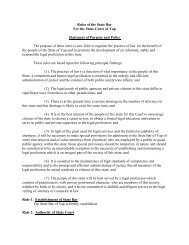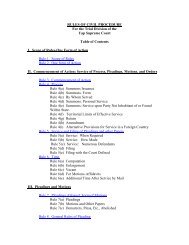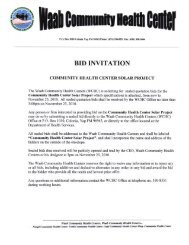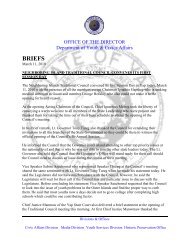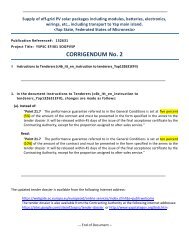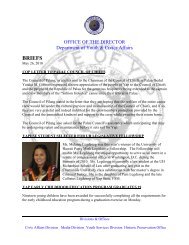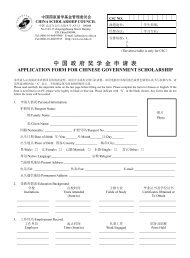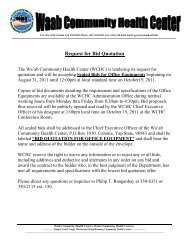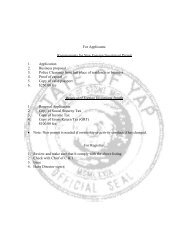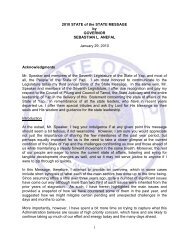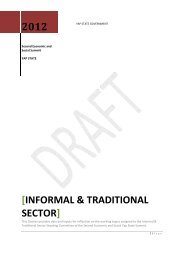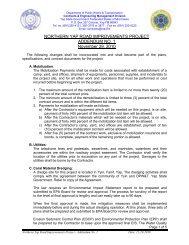2011 Inaugural Address By The Honorable Sebastian L. Anefal ...
2011 Inaugural Address By The Honorable Sebastian L. Anefal ...
2011 Inaugural Address By The Honorable Sebastian L. Anefal ...
- No tags were found...
Create successful ePaper yourself
Turn your PDF publications into a flip-book with our unique Google optimized e-Paper software.
<strong>2011</strong> <strong>Inaugural</strong> <strong>Address</strong><strong>By</strong><strong>The</strong> <strong>Honorable</strong> <strong>Sebastian</strong> L. <strong>Anefal</strong>Governor, State of YapCommunity CenterColonia, YapJanuary 10, <strong>2011</strong>Siroo ko But, ma Siroo ko Dalipi Nguchol, Siroo ko Pilung nge Tamol, ma siroongomed e girdii ni gimed gubin. Wenig ma siroo, dab mutayed machmed rog.Kam magar magard gad.Speaker Henry Falan and <strong>Honorable</strong> Members of the 8 th Legislature, State of YapVice President Kerai Mariur and your Delegation from the Republic of PalauSecretary, FSM Dept. of TC&IDean and Members of the Diplomatic CorpsChief Justice and Associate Justices of the State CourtFormer Governor Vincent Figir and Former Lt. Governor Hilary TacheliolNational and State OfficialsMembers of the Clergy, Private Sector, and Civil SocietyDistinguished Guests,Families and friends, and my fellow YapeseIntroductionGood Morning to all of you and I thank you all for availing your time and yourparticipation in the celebration of our joint-inauguration.On the occasion of my Second State <strong>Inaugural</strong> <strong>Address</strong>, I would ask you to join mein recognizing the 27 nd anniversary of our State Constitution. With the ratification1
of the Yap State Constitution, on November 2, 1982, our forefathers, our peopleand our State Government realized a vision of a common commitment -- andafter centuries of colonialism, dependence and separation, we chose to moveforward, towards a brighter independent future.Today, as I stand before you, with a sense of humility and gratitude, I also feelproud and elated at the same time because of you, the people of Yap. It is fittingtherefore that I congratulate all of you; the people of all the small islands in theState of Yap and past and current leaders for staying the course. While our voyageis still in its enfant stage, comparatively speaking, the course of our journey hasalready been set. And while our journey may face strong winds and dangerousseas, we can and we will survive together.I would therefore ask that we rededicate ourselves to realizing our originaldreams and expectations. This will not be an easy task and will require ourgreatest collective efforts.<strong>The</strong>re are many external development partners, some of whom are here with ustoday, that I would like to recognize. First, I must thank the United States, acountry that has stood with us for over half a century in our quest for a better lifefor our people.We are likewise grateful to our other major development partners -- Japan, thePeople's Republic of China, the European Union, France, Australia--just to name afew -- for their valuable contributions toward our growth and development.2
Similarly, we extend our gratitude to the many international and regionalorganizations, including a multitude of NGO’s that have been helping the FSM,particularly Yap, on our difficult job of becoming a meaningful member of theglobal community.We are also very fortunate to have close island neighbors and friends – Palau,Guam, the CNMI, and the Marshall Islands -- with whom we continue to maintainclose relations. We thank you for all your partnership in our common approach tosustainable development in the Micronesian region. We thank you sincerely foraccommodating the many Yapese who have chosen to make your island theirhome away from home.With an un-proportional number of our young people serving in the United Statesarmed forces around the world, most particularly in Iraq and Afghanistan, wemust all offer a debt of gratitude for their sacrifices for our country and worldpeace. As we progress with this New Year, may the Lord’s blessings and guidancebe upon our sons and daughters to keep them of harm’s way.My fellow Yapese, before I present my second term’s <strong>Inaugural</strong> <strong>Address</strong>, I mustcommend the members of the Yap State Legislature, the traditional leadershipand all leaders of Yap, present and past, for their dedication and hard worktowards the goal of serving the people of Yap. Lt. Governor Tony Tareg and Iwould like to express our sincere appreciation and gratitude to the Yap StateLegislature and the state leadership for supporting this last administration in3
moving forward with its development agenda. Any accomplishment of theAdministration is a shared accomplishment with the Legislature and the Stateleaders, and most of all, the great people of Yap for their cooperation andunderstanding during the last four challenging years. In the same vein, wesincerely thank all the voters for exercising their inalienable rights in the lastelection.Having said that let me make it clear that this does not mean that our work isfinished. We obviously have the next four years to go. <strong>The</strong> honor andresponsibility given to us as elected officials by the Yapese people must continueto motivate us to do our very best to ensure that we continue to lay thefoundation for future generations and the next set of elected leaders of our greatisland state – a future that we can all look forward to.BackgroundWhen I gave my Inauguration Speech four years ago, I indicated that we would beentering into doing “business unusual”. I also indicated to you that thegovernment would need to run efficiently and effectively. This was because itwas clear on day one of the Amended Compact that our government was goinglow and lower on annual Compact funding streams, low on local revenuegeneration, but with a tendency for higher expenditure, and it was necessary toestablish a better model of government and good governance in the State of Yap -- a model of proper planning, a model of fiscal prudence, a model of institution4
uilding, a model of self-reliance and a reputable model that is trust worthy – allto ensure a brighter future for our children.At the beginning of the New Millennium in the FSM, it was evident that we couldno longer continue to spend more than what we brought in. From 1995 to 2000,the FSM perhaps had the luxury of a number of Compact and non-Compactrevenue resources that allowed some of us to increase local expenditures foroperations by up to 20% in some places. In order to ensure that governmentservices in the State of Yap would continue to be responsive to the requirementsof our people, it was imperative in FY 2008 when we first took office to emphasize“business unusual” by living within our means. A wise man had said once thatthere is no way for Yap to spend ten pieces of stone money when what you see inthe stone money bank is one small piece that does not generate interest earnings.<strong>The</strong>re is no better time to start believing and practicing the realities behind thisstatement than right now.Faced with this stark economic reality from day one, it was a monumentalchallenge to “Preserve the Best; and Improve the Rest”, as my good friend,President Tommy Ramengesau, Jr. of Palau, always says. This was because therewas not much to preserve, but everything else needed major improvement. Weunderstood that we needed to put into place strong economic and fiscalmeasures and policies that would allow us to weather our economic storm, andthereby sail into the rest of this millennium with a renewed hope for our state’sfuture.5
In order to accomplish this broad goal, we instituted a roadmap that put forth ourmedium term economic and fiscal strategies. Regarding our economic strategy,we largely focused on developing our economic institutions, including thefollowing:• Establishing the regulatory frameworks that facilitate strong sustainableprivate sector growth and the protection of our environment;• Continuing investments in our infrastructure, within a proper planningframework;• Assessing and developing key productive sectors of our economy thathave the potential to support sustainable income generationopportunities; and• Containing the cost of government through balanced budgets, whereexpenditures were aligned with actual revenue receipts predicated uponpriority development areas.Each and every one of these strategies had one primary goal: to improve thequality of life of the people of the State of Yap.To contain the cost of our government, we started instituting an immediate dualstrategy: maintaining small, affordable government operations; and taking stepsto expand our revenue base. To right-size our government, we –• continued outsourcing operational support services, such asmaintenance, that could be better provided by the private sector;6
• Introduced performance management and strategic planning to improveaccountability and productivity of expenditures;• Began assessment for a re-organized Executive Branch to eventuallystreamline government operations;• Developed a cost reduction plan to help reduce operating expenditures;and• Continued retirement process and hiring restrictions of governmentemployees to further reduce operating expenditures.To expand our revenue base, we –• Strengthened our revenue collection efforts by focusing resources onrevenue generating activities to improve compliance;• Engaged in a nation-wide tax reform process and expanded user feescollection to help recover some of the costs of providing certain publicservices; and• Set out to identify and began formulating grant proposals secureexternal assistance to help us build the foundation for future growth.Our efforts to strengthen our economy and to put ourselves on a sustainablegrowth path were made more challenging by a number of unprecedentedexternal events that negatively impacted all of us. As I mentioned earlier, webegan in the aftermath of a dark cloud from the Financial Crisis, which had amajor effect on the growth of our private sector, and therefore on our revenuestream.7
In the first half of fiscal year 2008, we faced a major dengue fever outbreak andcoupled with the rebuilding of public infrastructure facilities destroyed ordamaged by Typhoon Lupid since 2003 and Super Typhoon Sudal in 2004.Consequently, some 423 public assistance projects out of a total of 607 projectsfunded by FEMA after these two natural disasters, at a cost of over $17.50 millionremained to be implemented. More significantly, we had to contend with animposed air carrier embargo and with the remnants of the bombing of the WorldTrade Center in New York City, now known to everyone as “9/11”. Immediatelyafter this event, we suffered roughly a 20 to 30% reduction in our tourism and thecorresponding loss of revenues, which aggravated the earlier revenue loss fromthe closure of the only garment factory in the State. Moreover, the wars inAfghanistan and Iraq, which have continued to adversely impact tourismthroughout the world for a long period of time, have not been of any help to tinyisland economies, and Yap is no exception.In between the wars in Afghanistan and Iraq, we also faced the impacts of theEnron and Worldcom collapse, which further restricted our Compact investments,and the California State dock workers’ strike and Typhoon Ponsanga in Guam thatdisrupted shipping and goods to the islands that resulted in further reduced localrevenue collections. After our economy finally started to show signs of minuteimprovement, we were then severely hit by the world-wide H1N1 epidemic,which eventually required that we take restrictive measures towards all incomingvisitors from near and afar. <strong>The</strong> impact of this action was quite severe on ourtourism industry and once again on our national revenue share.8
Despite these many external forces that placed enormous strain on our financialresources and our ability to provide needed public services to our people, Ibelieve that we are entering the first year of my second term much preparedeconomically than when we entered my first term. We have exercisedexpenditure restraint; we are pursuing revenue expansion measures; we continueto invest heavily in our infrastructure; we have began to put in place theframework for environmental protection and management; and we continue togive priority consideration to health and education initiatives. Through theseactions, we have laid the foundation for sustainable growth, but the path webegan constructing four years ago is far from being done and countless moreinitiatives need to be put in place.We know what still needs to be done. We have the people and we have thedetermination. And I believe that if we work extra hard together for the next fouryears, we can give the next Governor, and the next Legislature, a real chance tomove Yap much closer to our ultimate goal of real sustainable economic growthand toward greater economic independence. <strong>The</strong>re is a price to pay to grow, andcommitment is the price. As leaders, I firmly believe we see more than otherssee, farther than others see, and before others see when and if we make thecommitment to doing so.In 2007, I began saying that Yap was at a crossroads and we could build strongfoundations for our future despite thundering global crises. In 2008, I mentionedthat there were dynamic potentials for future growth. In 2009, I told the Cabinet9
that there were signs of stability. Just last year, I wanted to elevate us from beingstabilized to emerging, but the statistics have yet to be publicized. Today, if we allcontinue to make the right decisions, I believe that we will be on track and well onour way. <strong>By</strong> ‘the right decisions’, I refer to the need not only to significantlymodernize our tax laws and thereby expand our revenue base for the future, butalso the need to further strengthen our banking system and establish an effectivelegal framework for business activities, while continuing to work to contain thecost of government. <strong>The</strong>se assumptions also depend upon successful discussionswith the FSM National Government and United States regarding the Compact ofFree Association and outcomes that will protect us all against unforeseen andimmediate external economic shocks.State of the StateLadies and Gentlemen, a review of the state of the State of Yap must first takeinto account the global economic crisis that has reached our shore. Like all majorinternational and regional development partners, we too have been experiencingthe adverse impacts of this economic turmoil. This international financial meltdown,in conjunction with an earlier fuel crisis and a continuing food crisis, hasplaced the small islands developing economies in a state of economic crisis. Inaddition, climate change has continued to threaten food security and our veryexistence throughout these tiny remote islands of ours.This global recession is intensified by our own national recession, which has beenon-going since 2005. <strong>The</strong> average income of our people has steadily declined10
during this period, from $1,934 per person in 2005 to $1,832 in 2007, and it isestimated at around $1,700, if not less, in 2010. This figure is an indication of notonly lower wages, but also of lost jobs. While figures are not yet final, it isprojected that this economic crisis will continue this year and very likely into thenear future.<strong>The</strong>se recessions have left our island home, our country, with unprecedentedfinancial challenges. For example, the Yap Monetization Program within the FSMPooled Investment Portfolio had lost a staggering $8.75 million in 2008. Partiallyas a result of the financial turmoil, the FSM Social Security System's underfundedliability has increased dramatically. Likewise, our Mi-Care Health Care Plan hascontinued to operate in deficit over the past years. Both of these mandatedNational Government responsibilities will require immediate attention andsignificant capital infusion to survive in the coming years. Left unattended, theimpact would be devastating on our people, including you and me.In addition, the banking sector has shown an overall slowdown in commerciallending and a reduction in consumer spending. In 2008, consumer loansdecreased by $1.3 million and development bank loans decreased by $1.5 million.<strong>The</strong>se trends may likely continue unless remedied sooner rather than later.Sadly, no citizen has been left untouched by this current global crisis. And thereare no quick and easy fixes to the recession plaguing our economy. Indeed, it islikely to get worse before it gets better.11
My fellow citizens, we have been faced with a financial storm of unparallelmagnitude. It is therefore imperative in the next four years that we examine andimprove upon all existing opportunities, both internal and external, as envisionedunder our development goals, to enable us to recover from the effects of thiscrisis today and be well on the road into the future.Responses to CrisisFrom day one, in partnership with the FSM National Government and others, thisAdministration has been working to respond to this growing crisis and to build abridge to a better economy. I will cite some of these action-oriented responses inthis <strong>Address</strong>. Our strategy has been, and shall continue to be, broad-based andfocused on measures that may likely have an immediate impact on our economyand that would lay a strong foundation for long-term sustainable economicgrowth and development.Infrastructure DevelopmentDuring the past four years, we have made great strides in freeing up availablefunding to implement infrastructure projects in the state that have sat idle since2004. All told, this represents more than $25.0 million worth of infrastructureprojects, including $1.60 million dollars worth of completed projects, $10.50million more projects currently under construction, $7.70 million worth ofprojects in the design phase, and $4.40 million in projects pending task orders fordesign work. As we speak, the Yap Memorial Hospital Renovation Project, the12
Early Childhood Education Building Project, the Airport Improvement Project, theSports Complex, and the Northern Yap Road Improvement Project are the majorprojects underway at this point aside from smaller renovation projects in healthand education.Furthermore, matching funds for the ADB Omnibus Infrastructure DevelopmentProjects loan for water development for the Gagil-Tomil Water Authority havebeen secured from Compact Infrastructure Sector Grants. This has resulted inmore than $2.20 million dollars worth of additional infrastructure projects forYap.<strong>The</strong>se projects represent the largest outlay of money in the history of Yap at anygiven time. In fact, it is projected that these construction projects will result in thecreation of at least 250 jobs and new income of approximately $ 1.80 million. Dueto the great significance of these projects to the welfare of our people, they willrequire the continued personal attention of this Administration.Continuation of ReformsBeginning in 2008, the Administration has assessed all its functions andoperations and reorganized where necessary in order to streamline existingfunctions and to bring about efficiency. At this juncture, allow me to thank myCabinet and staff for the sacrifices they have made during these many years ofreform. I commend all of you for your diligence, dedication, and efficientperformance of your duties. Most of all I thank you for your hard work.13
We are committed to continuing this reform effort to make further improvementsto our governmental structures over the next four years. Down-sizing thegovernment is very difficult indeed, yet it must be undertaken in order to gainefficiency, reduce costs and channel limited funding resources to priorityprograms that our citizens desperately need. We must strive to live within ourmeans while we also develop the private sector and create jobs.In the context of this government reform, the Administration has worked, and willcontinue to work, to revamp policies to redesign public sector investment,especially in Education, where we spend more than 30% of our total staterevenues. To date, we surely have not made the required advances in educationto ensure jobs for our youth in the future. In fact, in some areas, we havebacktracked. To progress, we must immediately work to establish the groundworkfor future improvement. And let us do so in full recognition that education is ajoint responsibility between the state and national governments – but let us all doour part.This administration will continue to take the necessary steps within our areas ofresponsibility: setting policy and curriculum standards, facilitating teachercertification, providing classrooms, and working with the school communitiesthroughout Yap. And we urge the FSM National Government to undertake itsrespective responsibilities in providing good quality education to our children.14
For the longer term, we are very cognizant of the desire and need to address thelooming economic and potential financial challenges over the remaining thirteenyears of the Amended Compact period, and the prospect of no financialassistance once the Compact Treaty terminates in 2023. Because of thispotentially awesome challenge, the Administration anticipates to work diligentlywith the State Leadership once the Cabinet is confirmed for the launching of aSecond Economic Summit for the purpose of fine-tuning and chartering the newpath going forward.Energy ReformIn 2008, before the international financial crisis, our primary financial concern wasthe increase in energy costs. As you will recall, the resident consumers in Yapwere paying around $6.00 per gallon at the pump, while in the outer islands theywere paying more than $7.00 per gallon. Although fossil fuel prices have lowered,we can assume they will once again increase as international markets recover. Wemust therefore continue to take the needed steps to ensure an affordable andrenewable energy future.To respond to this reality, we initiated a clean energy package to provideaffordable renewable energy sources and also to ensure a cleaner environmentalfuture in the State of Yap. Our partnership with the FSM National Governmentand the other three State Governments of Chuuk, Pohnpei and Kosrae in responseto the fuel crises resulted in the creation of the FSM Petroleum Corporation whichhas enabled us to buy cheaper fuel. In addition, through the Chief Executive15
Council, consisting of the FSM President and four State Governors, an energypolicy is in place that will pave the way to an environmentally friendly andsustainable approach to meeting our energy needs. <strong>The</strong> policy, which reflects thepolicy objectives of Yap State, should be adopted and implemented shortly asfunding becomes available.Specifically, these policy considerations are part of the renewable energy packagethat will be advocated and pursued by the Yap State Public Service Corporation inphases in accordance with funding availability. It is envisioned that these phasesto electrify the entire State of Yap for the first time by transitioning from fossilfuel to renewable energy will be pursued under the ongoing EU Funding Schemes,namely the Energy Facility II for roughly $3.3M and EDF 10 for $3.0M, mainly forsolar energy in all outer islands, and possibly under an ADB project loan financingfor Yap Island Proper estimated at around $8.0M for solar and wind energy. <strong>The</strong>remaining segment is being sourced from a small French grant and out of localand national resources. Over the next five years, this planned renewable energyproject is estimated to cost around $20.0M, but all islands in the state would belit. I respectfully ask the Legislature to work collaboratively with theAdministration in support of lessening our dependence on fossil fuel to renewableenergy as much as possible in the years to come.Ensuing Budgets<strong>The</strong> FY 2012 proposed budget that will be submitted to the Eighth Legislature isenvisioned to be one of restraint and is in line with our initiatives to transitionfrom budgetary growth towards a precautionary approach during this period of16
uncertainty. Given these uncertainties, the Administration has wrestled with thechallenge of addressing increasing needs with rapidly dwindling resources.Nevertheless, it is prudent to await the outcomes of the anticipated SecondEconomic Summit, reassess the financial health of the government and theeconomic predicament before venturing too far into pursuing our developmentgoals and objectives in the ensuing fiscal years.<strong>The</strong> subsequent annual budgets should lay out our plan to meet emergingchallenges and strengthen the private sector – but fulfilling our obligation tomaintain a balanced budget while striving to maintain the most importantfunctions of government and minimizing harmful impacts on our citizens.Specifically, our ultimate objective is to stabilize and grow the local economy bycontinuing to develop our economic base to ensure sustainability and greater selfrelianceover the long-haul. We will continue to reform the current budget formatto ensure that all proposed expenditures are relevant to priority developmentareas as identified in the FSM Strategic Development Plan.I seek the cooperation of the Eight Legislature on these basic principles ofallocation of limited financial resources to ensure that we stay the course of oursustainable development agenda. I encourage the FSM National Government’sbudget allocations to be aligned with those basic principles.Moving ForwardMy friends and fellow citizens of Yap, in moving forward, let us be reminded thatwe have rough seas ahead of us. With that in mind, we must carefully consider17
the best approach towards a successful reform. For the Executive Branch, webelieve that success must begin with 'good governance', a government systemthat is fair, accountable, efficient, transparent and well planned as I mentioned inmy first inaugural address fours ago. To achieve this goal, we must establishappropriate criteria and measurements of our overall performance. Whileachieving good governance will be difficult, I believe that it is our government’sonly course for success.<strong>The</strong>re is no doubt that this is going to be a challenging four years and it willrequire modern tools and innovative solutions to meet our problems and seizethe opportunities that will serve the best interest of Yap. I'm going to be asking alot of you. I want you to think outside the proverbial box. I want you to give methe best advice you can. I want you to understand there is nothing that Iwelcome more than a good constructive debate and the kind of dialogue that willmake us better. I do not think anyone would eagerly welcome gossiping, fingerpointing and backstabbing.We cannot be our best if we don't demand that from ourselves and from eachother. Lt. Governor Tony Tareg and I will give you our very best efforts. We willdo all that we can, working with Yap State Leadership, to make sure that wedeliver on the goals that are at the very core this new Administration. So we needto collaborate, and we need to have a sense of openness and candor in this nextfour-year period. And I invite that from everyone.Now, not everybody's ideas will make it into policy, but we will be better becausewe have heard from each other.18
Tax ReformFor our broad reforms to bear long-term impacts we must finalize our proposedtax reform and improve collections and distribution at both the state and nationallevels. This reform should equalize our tax burdens. This should result in tiltingrevenue streams in favor of the state governments and result in long-termbeneficial impacts for our people.Having said that, I intend to submit to the Legislature a much needed modern taxlaw that is necessary to strengthen our private sector, our government and ourpeople. We recognize that passing comprehensive tax laws is very challenging.But a modern tax law is critical if we are to have a strong and vibrant privatesector. We must recognize this necessity for our future. As I have said before, wemust create revenue sources that pay for our own infrastructure needs and thatreplace grant revenues from the United States that currently finance a veryconsiderable portion of our health and education. We must also improve thecapacity of our people to provide essential services, both in the public and privatesectors that will permit the economy to grow and to ensure that benefits flow tothe people. As I see it, we have but limited options of either to increase the taxrevenue by widening the tax base, or reduce public services to an affordable level.<strong>The</strong> remaining option is the combination of doing a little bit of both options toease the pain.I am committing this Administration to work closely with the state leadership andthe private sector, as well as with FSM National Government leadership, to havethe necessary enabling legislation passed by the end of the year, at the latest. It is19
high time that we have this new tax system in place so that our people andbusinesses can enjoy the resulting benefits. More importantly, the nation-widetax reform must be instituted in compliance with both the national and stateconstitutions, most especially the Yap State Constitution.Once again, I kindly seek the cooperative support of the Eight Legislature of theState of Yap in this area.Enhancing Economic Institution-Building CapacityIn addition to putting into place the necessary laws, regulations and programs toprovide our private sector with the ability to compete, we must also modernize asmuch as possible existing governmental institutions to meet minimum standardsand consequently enhance our ability to compete in the national, regional andinternational market place. We must remember that investment flows tojurisdictions that follow international rules in a timely fashion. Unfortunately,hesitation on these issues has continued to slow the process of meeting the needsof our people. And, in the end, we stand to pay the price for those delays.In the last four years, I must applaud the Seventh Legislature for passing manyessential pieces of legislation. Aside from annual budget appropriations andmany subsequent supplemental budget appropriation laws, the SeventhLegislature passed countless laws during this period, including the Yap State TrustFund Act, the Manta Ray Protection Act, and the Sea Cucumber harvesting lawand the User Fee law--just to name a few. Unfortunately, a good number oflegislative measures proposed by the Administration have died with the Seventh20
Legislature. In the coming months, the Administration will work with theappropriate standing committees of the Eighth Legislature for the possible revivalof the few measures we believe should be put to public debates for policyconsideration.Moreover, I urge the Eighth Legislature to consider adjusting and improving ourlegal framework in the areas of eminent domain, limitation of actions,attachments, execution and orders in aid of judgment, domestic relations, fish,shellfish and game, land planning, public health, as well as safety and welfare. Istrongly recommend to the Legislature to carefully assess these areas and othersas may be necessary to determine what new legislation must be enacted, thentake appropriate action.Strengthening Business EnvironmentMy friends, it is past due time to tackle the difficult problem of businessdevelopment through a comprehensive approach. As a nation, and as anindividual state, Yap must create domestic opportunities for our people to stemthe current brain-drain and shore up the necessary human capital for nationbuilding.To accomplish this, this Administration will continue to support theestablishment of new business opportunities and expansion for existingbusinesses in the state.In addition, we must, as a nation, and as individual states, recognize the need forthe injection of foreign investment dollars. For this to happen, we must continueto improve our foreign investment laws and regulations. Above all, we must21
implement such legislation professionally with extreme efficiency andeffectiveness in order to make a sensible difference. <strong>The</strong> current legal frameworkfor foreign investment can be further improved to protect our local businesses, ifand when necessary, and allow for their growth with new partners from abroad.This will only occur if all of the four state governments join together with thenational government to create an environment that is conducive to doingbusiness.Reduction in Government WorkforceWith a strengthened business environment, we will then be able to move forwardwith the very real need to reduce government workforce. With more revenuefrom an enhanced business sector, we can even comfortably consider a salaryincrease for the workforce instead. Expanding business capacity and reducing thegovernment workforce must go hand-in-hand. <strong>The</strong> current recession requires thatwe continue to work towards right-sizing our government. We should becognizant that any workforce reduction effort must be accompanied bygovernment sponsored initiatives that focus on employee retraining and privatesector opportunities.Education and HealthWhile modest improvements have been made in the areas of health andeducation, we have not achieved a record of steady and sustainable progress. Inboth sectors, many of our challenges can be met through the support of improvedfacilities, better and increased numbers of licensed, trained staff and continuouscollaboration with stakeholders and service providers.22
In the area of health, it is crucial that we advance our experience-sharing andpartnership with other hospitals in our region to respond to expanding healththreats. <strong>The</strong> need for health insurance coverage for the Yapese people isrampant. And in education, I encourage parents to be more personally involvedin the education of their children. Our young people are the primary resource ofour long-term sustainability as a government and the critical survivability role toplay in our island communities as a people. This involvement does not stop at thefamily level, but must include a more proactive and focused approach from allstakeholders - government, traditional and community leaders, civil societies,churches and, of course, the youth themselves.Food SecurityOn the domestic front, we must recognize that going prices of imported foodstuffare no longer affordable to a large segment of our population. I realize that thesehigher food prices are hitting us where it hurts. We must never forget the factthat our ancestors populated and thrived sustainably in these islands, generationsafter generations, without any semblance of dependence on imported food, letalone unhealthy processed foodstuff.We must therefore take whatever actions necessary to reduce these costs, bothin the short and long-term. We must respond to this reality through thestimulation of competition in the market place and in the development of healthyand affordable domestic food products. Let us concentrate on increasing theproduction and consumption of local foods as a step in the right direction towardfood security.23
For this pursuit, I respectfully ask for the support of the traditional leadership inmobilizing the island communities to achieve our goals in this area by growing,harvesting and consuming more local food.Fisheries, Agriculture and Aquaculture OpportunitiesWe must also do a much better job in taking advantage of the marketopportunities for our own domestic agriculture and aquaculture products in theMicronesian region, especially taking into account the expansion of the economyin Guam due to the coming United States military buildup. To assist our people inthis area, this Administration is committed to continue working diligently with allconcerned parties to remove trade barriers in the region, and eliminateunnecessary import and export requirements on agriculture and aquacultureproducts.For these sectors, this Administration will pursue ongoing dialogue, and even newinitiatives, that will lead to fisheries and agriculture development activities thatshould render export potentials, employment opportunities, revenue generation,and related economic spin-offs.EnvironmentTurning to an important area, I would like to underscore the importance ofintegrating environment in our social and economic development planning, as it isone of the critical pillars of sustainable growth and development. Environmentmust underpin all our planning and implementation strategies. In this way, we will24
e promoting a holistic and coherent approach to sustainable developmentefforts across the entire State of Yap.In this connection I am pleased to note the proactive participation of our nationalgovernment in the ongoing international negotiations on replacement for expiringprovisions of the Kyoto Protocol that address climate change. <strong>The</strong>re is no doubtthat climate change is the single most serious threat to our islands and our veryexistence. Already we have fallen victim to an industrial phenomenon to whichwe have neither effective response nor any meaningfully affordable defense.I therefore call on all governments and civil society to redouble their effort inclimate change adaptation.I also urge the Legislature and the Traditional Councils of Chiefs to unite with theAdministration in implementing the Micronesia Challenge, a sub-regionalinitiative to conserve and protect our valuable natural heritage -- ourenvironment. <strong>The</strong> potential of this initiative to leverage external assistance isenormous.When all is said and done, I would urge the FSM National Government to expediteaccessing both technical and financial assistance to mitigate the threateningeffects of sea level rise.CultureAs part of our sustainable development strategy, we must give due recognitionand importance to the cultural identity of Yap. Within this context, we mustrecognize the need to develop cultural industries and initiatives that present25
significant economic opportunities for development. <strong>The</strong>se industries have thepotential to expand and diversify our economy and develop resilience againstexternal economic shocks. As a step to help move us in this direction, I thereforeseek financial support from any source or sources in funding the construction ofbuilding structures that will house Yap Museum.<strong>The</strong> government-owned radio and TV stations’ programming must be adjusted tobe more educational and cultural oriented to help advocate, promote andpreserve our customary values and cultural heritage among the youngergenerations. Similarly, all public primary and secondary schools throughout theState must strive to improve curriculum and instruction on the Yapese Culture atall grade levels.Five-Year Compact ReviewIn regard to our on-going relations with the United States, with our inputs into theFive-Year Review of the Amended Compact by the United States ExecutiveBranch, as required under the Amended Compact Act, we remain hopeful that theFSM National Government would update us on progress made thus far.We look forward to adjustments to the agreement that defines our importantrelationship. This review could not have been timelier, when the FSM faces somany unforeseen challenges to its sustainability brought about by the globalfinancial crisis and climate change, among others.Regional Initiatives26
In order to respond to the many needs of our people, we must also work with ourcloser neighbors to identify sub-regional initiatives that will increase capacity, cutcosts and widen our responses to island issues.I therefore intend to become even more active in the Micronesian ChiefExecutives' Summit and indirectly with the Micronesian Presidents' Summitprocesses to strengthen our capacity to be proactive to environmental issues,particularly through the Micronesia Challenge and other initiatives in the areas ofenergy, tourism, invasive species, telecommunications and solid wastemanagement. Many of these issues we cannot challenge directly withoutpartnership with the FSM National Government to access a more collaborativeeffort with our brothers and sisters in the region.I will also work towards the establishment of the Micronesian Center for aSustainable Future, a proposed sub-regional institution that will strengthen ourisland capacities, cultures and political outreach to the world.It is time that the islands of Micronesia stand together as a united front in theregional and international forum.ConclusionMy friends, it has been a very interesting journey over the last four years. Asgovernment officials, whether elected, appointed or otherwise, we may not havealways agreed, nor will we always agree in the future. But I believe that in ourhearts, we have the best interests of our people at the core of our decisionmakingprocess.Unfortunately, we as humans sometimes allow our27
disagreements to override our efficiency in making some of the critical decisionsthat are necessary for the government to move forward for our people toprosper.<strong>The</strong> people of Yap have spoken to us in many forums, most notably through thelast State Economic Summit in 1997 and the 3 rd National Economic Summit andsubsequent National Symposiums, including the Strategic Development Plan. <strong>The</strong>aspirations and needs are nothing new. We have known all along what we needto do but we simply have not moved forward with concrete actions.I firmly believe that the people have made it clear that they want strongeconomic institutions, a well managed tourism industry, a diversified economy, aresponsive government, better means of transportation and telecommunications,good quality education and health services, expanded opportunities and capacityfor the people of Yap and a fair share of the benefits of economic growth anddevelopment.To meet the expectations of our people, we must, and let me emphasize the word‘must’, make the hard decisions that will lead to these necessary results. Wecannot make all of the people happy all of the time. But we can convince thepeople that the basis of our actions is their long-term welfare, even if, on a singleissue, our decision may not suit their wishes.As I have indicated in the past, in our efforts to grow and prosper, there will betemptations from the most unlikely sources, many that will not be in our best28
interests and many that may be self-serving. We must, as leaders, and as apeople, have the strength to turn down immediate offers of wealth at theexpense of future generations and look for a more balanced approach – one thatrecognizes the strength of unity and forbearance.My friends, the issues and challenges that we face today may all be not new.Through our cooperative actions, at the local and national levels, and at thelegislative and executive levels, we can and we must arrive at a consensus on away forward during these difficult economic times.Economic growth, stability and independence will ultimately necessitate that weall give away something to gain something. This is the way of life and it is truly the“Yapese Way”. We must be sure that when all is said and done, we retain ourcultural integrity, we govern ourselves, we respect the differences between ourcultures and we reap the benefits of our own development efforts.And for us to reap these benefits, we must have the involvement of each andevery living Yapese individual as a citizen of our growing nation. We mustremember that as long as a single person is without a job, an education, amarketable skill, health insurance, or a role to play in our destiny, then we havenot completed our voyage.Ladies and Gentlemen, with a focused and strategic effort, there is no doubt thatYap can and will overcome these challenges and continue to move forward toexpand economic options for all of our citizens. For every crisis there is anopportunity; and for every opportunity, there is hope for greater positivechanges.29
I therefore call on all of the People of this great State of ours to rise to theoccasion and to innovatively grasp your own opportunities. We must view theongoing crisis as a test to our resolve and our solidarity and the opportunity forthe people of Yap, our island and village communities, our families and friends, tounite together to change Yap for the better.For the next four years, ladies, I call upon all able Yapese men to search the worldover, capture and bring home to Yap a meaningful positive change, much thesame way that our forefathers did when they brought in shell and stone money ascurrency to reinvigorate trade and boost the economy. I call on Yapese livingabroad to contribute in small meaningful ways that can bring about economicchanges at home and I wholeheartedly challenge all the youthful people of Yap tobegin masterminding the next several steps of economic prosperity forgenerations to come after yours.Once again, thank you for giving me the opportunity to serve you as yourGovernor. It has been a profound experience. Let us get to work.God bless you and God bless all of us. Thank you all very much.30



